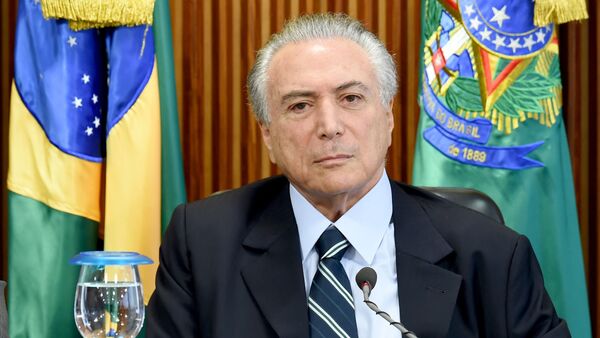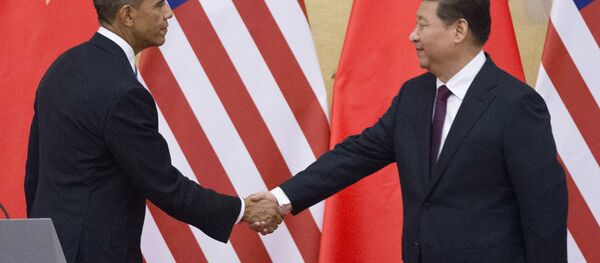On Thursday, a regional election court in Sao Paolo issued a guilty verdict against interim Brazilian President Michel Temer on election law violation charges, and declared the politician ineligible to run for political office for eight years as a result of having a "dirty record."
The court determined that Temer, the subject of several other corruption investigations, spent personal funds on his election campaign in excess of campaign finance limits. The interim leader is now barred from running for the office he currently occupies, underscoring the illegitimacy of his administration.
From the beginning, Temer’s installation into power by means of the impeachment proceedings against Dilma Rousseff was considered by Brazilians to be a coup by corrupt politicians seeking to oust a leader who intended to hold them to justice.
That truth was revealed shortly after Rousseff was suspended from office, when newspaper Folha da Sao Paolo released audio recordings implicating top cabinet officials and allies of the Temer administration plotting the ouster of the democratically-elected leader, in order to avoid criminal charges connected to the “Car Wash” investigation into illegal kickbacks traced to state-owned oil giant Petrobras.
The first series of tapes featured Romero Juca, the country’s planning minister and the head of the Brazilian Democratic Movement Party (PMDB), speaking with oil executive Sergio Machado about "putting Michel into power" in order to “stop the bleeding” associated with the investigation.
The influential minister immediately offered his resignation once the recordings were released, but the damage had already been done to Temer’s attempts to cast the impeachment proceedings as anything other than a coup. Notably, Temer, along with the two key actors in the impeachment process – former lower house leader Eduardo Cunha and senate leader Renan Calheiros – all belong to the PMDB party.
One week later, the newspaper released a new round of recordings featuring Temer’s transparency minister, Fabiano Silveira, advising senate leader Renan Calheiros on how to obstruct the Car Wash investigation. Brazil’s transparency minister holds responsibility for all government anti-corruption efforts, illustrating that the interim administration is akin to a fox guarding a hen house.
Despite growing chants by Brazilians for “Fora Temer” (out with Temer) and "Golpista" (leader of the coup), the interim government has speedily started to undo a decade and a half of democratically-supported social reforms.
On day one, Temer announced a new austerity regime, featuring large cuts to social services for poor Brazilians. Not long after, newly-minted Foreign Minister Jose Serra declared the country would transition away from regional economic collaboration and partnerships, toward an open-market US-centric deregulated-trade policy that has led working class Brazilians to fear economic exploitation.
In a final measure against supporting a social safety net, Temer declared the elimination of the country’s entire cultural ministry, citing costs related to bridging gaps among Brazil’s diverse diaspora.
The fate of Brazil now rests in the hands of the country’s sporadically violent senate, which will vote in six months following the completion of the upcoming impeachment trial on whether to oust Rousseff from office permanently. Rousseff’s opponents will need a 2/3 vote (54 of 81 members) to complete their coup, with the results of those proceedings expected to be decided by a razor thin margin.
In May, Brazilian senators voted 55 to 22 to advance impeachment proceedings against President Rousseff. The vote was taken under a circus-like atmosphere, with senators using their speaking time not to discuss impeachment proceedings, but rather to beg Brazilians to support reelection bids. In an absurd debate that featured fistfights, references to God, the Devil and gangrene, a highlight of the proceedings was Renan Calheiros’s tooth falling out of his mouth on live television.
The senate vote was nearly canceled after former lower house leader Eduardo Cunha, recognized as the chief architect of the impeachment effort, was ousted by the Brazilian Supreme Court on corruption charges. His successor, Waldir Maranhao, called for an annulment of the lower house vote during his first day in office, citing procedural irregularities, although many believe his opposition was traced to rumors that Cunha bribed legislators to support the impeachment vote.
The acting lower house leader quickly rescinded his calls for annulment after threats that he would be deposed from office and a direct challenge by senate leader Renan Calheiros who said the vote would proceed regardless of Maranhao’s objections. A constitutional crisis loomed in the South American nation.
A regime in which over 2/3 of its members face corruption charges, outed as participants in a coup, impeached their leader, Rousseff, who faces no corruption charges, but, with the audacity of the Temer administration’s crimes against Brazil reaching a fever pitch, it may only be days or weeks until the interim government collapses.







